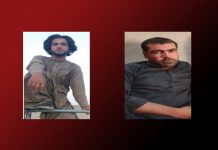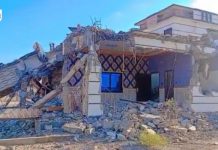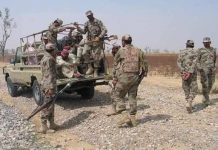Author: Kambar Baloch
In the second decade of the twentieth century, when Abdul Aziz Kurd laid the foundation of Baloch politics, the last armed conflict against the British (Marri – Khetran) had already reached its culmination.
Baloch nation has always considered it their first and foremost duty to stand against the foreign invasion and kept the level of resistance high. From Mehrgadh to Portuguese, British to the present day, Baloch have been keeping the spirit of resistance alive. For the love of the motherland they are fighting with enemies to pay the debt they owe to their soil.
Until the Second decade of the twentieth century, lack of political awareness and resistance against occupiers the external occupation always continued. This was the political disintegration of the predecessors owing to what the Baloch are still colonised by an imperial power.
In the last year of the second decade of 20th century (1920), Abdul Aziz Kurd and his colleagues founded a student organization called “Young Baloch”, which became the base of the Baloch political history. After nine years of Underground activities, in 1929 under the leadership of Yousuf Aziz Magsi they succeed in establishing an organized party structure in shape of Anjuman- Athehad-e- Balochan.
All India Baloch conference by Anjuman-Athehad-e-Balochan was held in Jacobabad and chaired by Mir Ali Nawaz Talpur of Kairpur. It was convened on 27 December and ended in 29 December 1932. The Purpose of Anjuman was to unite the Baloch nation and to create harmony between them. The following points were presented in the conference:
1. Elimination of FCR
2. Formation of an interim and constitutional government in Balochistan.
3. Establishment of industries in Balochistan
4. Establishment of institutions for higher education in Balochistan
5. Combining different parts of Balochistan to unite the Baloch.
In the second All India Baloch conference, held on December 1933 with support of the previous demands it was emphasized that a legal and constitutional government should be formed in Balochistan on emergency basis.
On January 1934, Secretary General of Anjuman, Abdul Aziz Kurd was arrested and due to the unavoidable circumstances Yousuf Aziz Magsi departed to Britain for a year. When he returned back to the country, he started advocating armed struggle for freedom and was busy in the endeavour to bring revolutionary changes in Anjuman and continued his struggle till his death.
Sudden demise of Yousuf Aziz Magsi in the earthquake of Quetta in 1935 and Abdul Aziz Kurd being in prison, the Anjuman lost its organised structure and got dismantled. After his release, he tried to reorganise the Anjuman. On February 5, 1937 the organisation’s central body meeting was held, they dismantled the Anjuman and founded the Kalat State National Party.
The Kalat State National Party began its struggle against the tribal system and the British rule in Balochistan and took practical steps to bring about reforms. The party endeavoured to strengthen the organisation and spread the program in every corner of Balochistan by promoting Baloch national ideology, National Party received profound support from the Baloch nation.
In compliance with the British officials and maintenance of their tribal survival, Sardars and Khan of Kalat opposed the Kalat State National Party. On 6 July 1939 Sardars attacked the annual meeting of the party at Mastung and assaulted the Party leaders.
Khan of Kalat Mir Ahmed Yar Khan banned the party on 20 July 1939 to get the support of chiefs and British officials. Party President Malik Abdul Rahim Khawaja Khel, Ghous Baksh Bizenjo, Gul Khan Naseer, Abdul Karim Shorish and dozens of workers were deported. Due to the ban on party and its activities in Kalat, the organisation shifted its headquarter to Shaal (Quetta) and maintained their activities from there.
Political Activities were outlawed during the Second World War (1939-1945) under the Indian defence Act, therefore, the Kalat State national Party continued its activities underground. Party officials called on Jawaharlal Nehru to speak out against the Kalat State national Party’s ban. Nehru assured the party officials of his support on condition to merge the party into congress, and the party joined “All India State People’s Congress” at the end of 1944, but soon left Congress as the masses opposed it and the party returned to its original state.
At the end of British occupation, Balochistan appeared on the map of the world as an independent state. Two constitutional assemblies were set up in the house; the House of Common and the House of Lords. The Lower house held its general elections and Kalat State National Party won majority of 39 seats among 52. Ghous Baksh Bizenjo got elected as the leader of the parliament. The Independence could not last long as on March 1948 Pakistan Annexed Balochistan.
In the leadership of Agha Abdul Karim, Kalat National party’s secretary Malik Saeed Dhawar, communist party Sindh Balochistan Secretary Qadirbaksh Nizmani, Baloch league’s secretary Mohammad Hussain Anqa along with their Comrades went to Afghanistan to lay the foundation of first guerrilla war against Pakistan. Lack of Support from Afghanistan, Soviet Union and Baloch tribes, the Baloch leaders could not continue the war and returned from Afghanistan by making covenant and agreements. Going against the commitments made to them, Agha and his companions were arrested near Kalat and remained in prison for several years.
After the release of Agha Abdul Karim, Ghous Baksh Bizenjo, Mohammad Hussain Anqa, Qadir Baksh Nizmani and Kalat State National Party’s colleagues founded the political party “Ostaman Gal” on 14 July 1955. Agha got elected as President and Anqa as secretary general of the party. The party opposed one-unit policy and demanded the united autonomous province of Balochistan.
Ostaman Gal emerged as the first organised political force after annexation and continued their struggle for political consciousness and awareness of national rights for Baloch nation.
On 2nd December 1956 Ostaman Gal joined the Pakistan National Party in which G.M Syed’s Sindh United Front, Haider Baksh Jatio’s Sindh Hari Committee, Khan Ghafar Khan’s Khudai Kidmathgaar movement and Abdul Samad Achakzai’s warwar Pashtun joined and merged. When Awami League of Mulana Bashani Faction Joined from East Pakistan (Present Bangladesh) on 1957, the name of Pakistan National Party was changed into National Awami Party.
National Awami Party became a platform for the joint struggle for oppressed nations and the elimination of one-unit. It was an effective voice for the rights of oppressed nations.
In the sixties, Baloch students founded the Baloch Students Organization, which gave a new direction to Baloch politics and became the preliminary of National politics in Baloch society and played a leading role in Baloch politics in every era.
In sixties, Baloch leaders were elected in the parliament of Pakistan, Baqi Baloch from Makuran, Attaullah Mengal from Kalat and Khair Baksh Marri from Shaal (Quetta). They pursued their struggle for Baloch rights in parliament, with the NAP continuously struggling against one-unit and for the fundamental rights of the nations. This struggle brought the end of one-unit and Balochistan was given the status of a province.
Baloch leaders, Khair Baksh Marri, Attaullah Mengal and Ghous Baksh Bizenjo continued their political efforts under the banner of NAP and NAP rose as the only nationalist party of Balochistan and succeeded to establish the first nationalist government in 1972. Khair Baksh Marri got elected as the provincial President of the party, Attaullah Mengal as chief minister and Ghous Baksh Bizenjo as the governor of Balochistan.
The government of nationalists could not survive for more than nine months and Bhutto overthrew the NAP government by arresting the NAP leaders in 1973.
Overthrow of NAB govt triggered Baloch insurgency under the Command of Mir Hazar Khan Bajrani, in which the London Group from Forth International, Mir Mohammad Ali Talpur son of Mir Ahmed Ali Talpur from Sindh and leaders of Baloch Students Organisation joined the struggle which continued till 1978. Due to the severe conditions thousands of Baloch Migrated to Afghanistan.
In July 1977 General Zia-ul-haq took over the government in a military coup and released all Baloch political Prisoners including NAP Leaders.
After the release of NAP leaders, Sardar Attaullah Mengal and Khair Baksh Marri abandoned Pakistani parliamentary politics and went abroad to pursue the political struggle for the sake of an independent Balochistan. While Ghous Baksh Bizenjo fought for national rights within Pakistani federation.
In the beginning of 1980, Bizenjo founded Pakistan National Party and with Tehreek e Istaqlaal presented a memorandum to general Zia-ul-haq for provincial autonomy and for the rights of nations. Owing to the ban on political activities by General Zia-ul-haq, the national party could not survive its activities for more than six months.
In 1981, exile leader Attaullah Mengal founded the “World Baloch Organization” in London; the purpose was to unite the Baloch diaspora and to promote Baloch culture. Mengal continued the struggle for a free and greater Balochistan where he launched a newspaper from London to propagate their cause.
Two years of exile in Britain and France, Khair Baksh Marri moved to Afghanistan to live with other exiles of Baloch nation.
In 1987 Shaheed Fida Ahmed Baloch and his colleagues kept the foundation of “Balochistan National Youth Movement”. BNYM was against parliamentary politics but before the general elections of 1988 they formed a political party named as Balochistan National Movement and participated in the elections and form Balochistan National Alliance with Nawab Akbar Khan Bugti.
In the general elections of 1988, Ghous Baksh Bizenjo’s Pakistan National Party got defeated and Balochistan National Alliance’s government came in power.
Nawab Akbar Bughti got appointed as chief minister of the province. After two years the president of Pakistan Ghulam Ishaq Khan overthrew the central government and provincial governments got dissolved.
In 1990 Balochistan National Movement emerged as a powerful political party but soon got into two factions split into Hai and Mengal. In 1990 Nawab Akbar Bugti laid the foundation of ” Jamuri Watan Party”. Mengal formed its Balochistan National Party and Balochistan National Movement continued their political struggle under the leadership of Dr Hai.
When Mujahideen captured the Afghan Govt, Balochs returned to Balochistan under the leadership of Khair Baksh Marri in 1993. They settled in Shaal and flourished New kahan at the heart of Koh-a-Chiltan. Khair Baksh Marri initiated the “Haq Tawar” circle that became base for the revival of Present Baloch National Movement.
Sardar Attaullah Mengal returned to Pakistan in 1996 and became active in parliamentary politics. Balochistan National Party participated in the general elections of 1997 and succeeded by majority in provincial assembly to establish government by alliance with Jamuri Watan Party. BNP government complained of federal intervention and relations with Jamuri Watan Party also deteriorated.
In 28 May 1998, Pakistan conducted nuclear tests in Raskoh, an area of Chaghi district Balochistan. Baloch nation strongly protested against it and in the meantime the establishment created an internal chaos in BNP. Akhtar Mengal
had to resign as Provincial Chief minister. Party divided into three Factions, BNP Mengal, BNDP and BNP (Awami).
In 2002 the ideological difference of Baloch leaders appeared in the council session of Balochistan National Movement. Dr Hai and Dr Malik Group emphasized on struggle of Baloch rights by being involved in Pakistani Federation and Ghulam Mohammad supported the politics of Baloch National independence.
BNM’s Dr Hai and Dr Malik group formed the National party with BNDP by keeping the agenda of Ghous Baksh Bizenjo in view to start itspolitics in federation.
Ghulam Mohammad Baloch organised a three day party council session in Shaal on 29 April to 1 May 2003 to Pursue the cause of Independent Balochistan. Ghulam Mohammad Baloch elected party chairman and Rahim advocate as secretary General. In the council session the name of party changed from Balochistan National Movement to Baloch National Movement and the party kept supporting Baloch National Independence, non-parlimentary politics and armed struggle as base for Baloch national Struggle.
In August 2006, Vocal Baloch political Leader of its time Nawab Akbar Khan Bugti was martyred which affected the parliamentary politics immensely while his death further strengthened the struggle of freedom.
2008 elections were boycotted by Baloch political parties and People’s party government was formed in Balochistan. With the PPP’s Aaghaz Huqooq Balochistan package, a series of abduction of political activists began in Balochistan, after which their bodies began to be found in the deserts and wilderness.
On 3 April 2009 BNM leader chairman Ghulam Mohammad along with his Companions Lala Munir and Sher Mohammad Were Abducted and their mutilated bodies were found on April 9. This started a series of Assassinations of Political leaders in Balochistan which is still going on. Hundreds of leaders and political workers of Baloch national struggle were assassinated but the national struggle for an independent Balochistan still continues.
Baloch nation largely staged a boycott against the 2013 elections, rejected parliamentary politics and pursued the path of the Baloch liberation struggle, but the internal squabbling of the Baloch struggle-related parties and organizations hampered the struggle on many fronts. Violence, mutilated corpses, rule of death squads and parliamentary politics is continued and on the other hand the candle of freedom struggle is inflamed.
Baloch political struggle has completed a hundred years of its journey and it still continues. A journey which Abdul Aziz Kurd started with the Anjuman Ahtehad Balochan and Kalat State National Party gave energy to it and the leaders of NAP gave a new dimension to the journey. Today the Cadre of Baloch Liberation Struggle has raised the bar of this caravan.






























